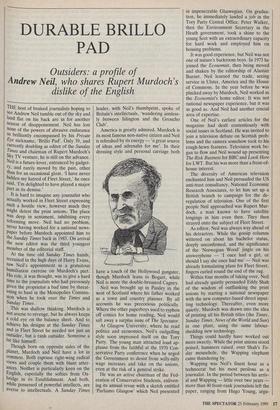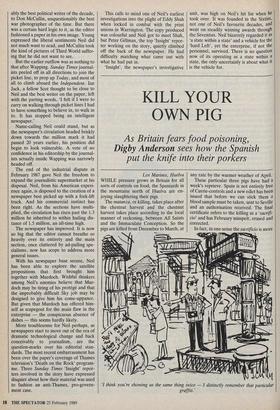DURABLE BRILL() PAD
Outsiders: a profile of
Andrew Neil, who shares Rupert Murdoch's
dislike of the English
THE host of bruised journalists hoping to see Andrew Neil tumble out of the sky and land flat on his back are in for another season of disappointment. Neil has lost none of the powers of abrasive endurance so brilliantly encompassed by his Private Eye nickname, 'Srillo Pad'. Only 39, and currently doubling as editor of the Sunday Times and chairman of Rupert Murdoch's Sky TV venture, he is still on the advance. Neil is a future-lover, entranced by gadget- ry, and rarely moved by the past, other than for an occasional gloat. 'I have never hidden my hatred of Fleet Street,' he once said, 'I'm delighted to have played a major part in its demise.'
It is hard to imagine any journalist who actually worked in Fleet Street expressing such a hostile view, however much they 'night detest the print unions. The place was deep in sentiment, inhibiting every reforming move. Neil had no problem, never having worked for a national news- paper before Murdoch appointed him to the Sunday Times back in 1983. On arrival the new editor was the third youngest member of the editorial staff.
At the time old Sunday Times hands, recruited in the high days of Harry Evans, saw Neil's appointment as a gratuitous humiliation exercise on Murdoch's part. His role, it was thought, was to give a hard time to the journalists who had previously given the proprietor a bad time by threat- ening to haul in the Monopolies Commis- sion when he took over the Times and Sunday Times.
This was shallow thinking. Murdoch is not averse to revenge, but he always keeps a cold eye on the balance sheet. And to achieve his designs at the Sunday Times and in Fleet Street he needed not just an outsider, but a rank outsider. Someone a bit like himself.
Though born on opposite sides of the Planet, Murdoch and Neil have a lot in Common. Both espouse right-wing radical views and couple them with blunt utter- ances. Neither is particularly keen on the English, especially the softies from Ox- bridge in its Establishment. And both, while possessed of powerful intellects, are averse to intellectuals. A Sunday Times leader, with Neil's thumbprint, spoke of Britain's intellectuals, 'wandering aimless- ly between Islington and the Groucho Club'.
America is greatly admired. Murdoch is its most famous non-native citizen and Neil is refreshed by its energy — 'a great source of ideas and adrenalin for me'. In their dressing style and personal carriage both have a touch of the Hollywood gangster, though Murdoch leans to Bogart, while Neil is more the double-breasted Cagney. Neil was brought up in Paisley in the west of Scotland where his father worked as a town and country planner. By all accounts he was precocious politically. Where the other paperboys used to syphon off comics for home reading, Neil would salt away a surplus issue of The Spectator.
At Glasgow University, where he read politics and economics, Neil's cudgelling style soon impressed itself on the Tory Party. The young man attracted loud ap- plause from the faithful at the 1970 Con- servative Party conference when he urged the Government to desist from willy-nilly wage increases and take on the unions, even at the risk of a general strike.
He was an active chairman of the Fed- eration of Conservative Students, enliven- ing its annual revue with a sketch entitled 'Parham Glasgow' which Neil presented in impenetrable Glaswegian. On gradua- tion, he immediately landed a job in the Tory Party Central Office. Peter Walker, then the Environment Secretary in the Heath government, took a shine to the young Scot with an extraordinary capacity for hard work and employed him on housing problems.
It was good experience, but Neil was not one of nature's backroom boys. In 1973 he joined the Economist, then being moved and shaken by the editorship of Alastair Burnet. Neil learned the trade, seeing service in Ulster, America and the House of Commons. In the year before he was plucked away by Murdoch, Neil worked as the Economist's home editor. It was not national newspaper experience, but it was as good as. And Neil had another crucial area of expertise.
One of Neil's earliest articles for the magazine had dealt contentiously with social issues in Scotland. He was invited to join a television debate on Scottish prob- lems and the camera somehow took to his rough-hewn features. Television work be- gan to flow and Neil wound up presenting The Risk Business for BBC and Look Here for LWT. But his was more than a front-of- house interest.
The diversity of American television enchanted him and Neil persuaded the US anti-trust consultancy, National Economic Research Associates, to let him set up a British branch to campaign for the de- regulation of television. One of the first people Neil approached was Rupert Mur- doch, a man known to have satellite longings in him even then. They then strayed onto the subject of Fleet Street. As editor, Neil was always way ahead of his detractors. While the gossip columns wittered on about his bachelor status, deeply unconfirmed, and the significance of the 'Norwegian Wood' jingle on his answerphone — once had a girl, or should I say she once had me' — Neil was already formulating plans for Fleet Street, fingers curled round the end of the rug. Within four months of taking over, Neil had already quietly persuaded Eddy Shah of the wisdom of outflanking the print unions by starting a national newspaper with the new computer-based direct input- ting technology. Thereafter, even more quietly, Murdoch was drawn into the idea of printing all his British titles (the Times, Sunday Times, News of the World and Sun) in one plant, using the same labour- shedding new technology.
Things could hardly have worked out more sweetly. While the print unions stood poised, hammers raised, over Shah's To- day mousehole, the Wapping elephant came thundering by.
Wapping was Neil's finest hour as a technocrat but his most perilous as a journalist. In the period between his arriv- al and Wapping — little over two years more than 40 front-rank journalists left the paper, ranging from Hugo Young, argu-
ably the best political writer of the decade, to Don McCullin, unquestionably the best war photographer of the time. But there was a certain hard logic to it, as the editor fashioned a paper in his own image. Young expressed the liberal sentiments Neil did not much want to read, and McCullin took the kind of pictures of Third World suffer- ing that he did not want to see.
But the earlier outflow was as nothing to that after Wapping. Sunday Times journal- ists peeled off in all directions to join the picket line, to prop up Today, and most of all to climb aboard the independent. Ian Jack, a fellow Scot thought to be close to Neil and the best writer on the paper, left with the parting words, 'I felt if I were to carry on walking through picket lines I had to have something to believe in, to walk in to. It has stopped being an intelligent newspaper.'
Name-calling Neil could stand, but as the newspaper's circulation headed briskly down towards the million mark it had passed 20 years earlier, his position did begin to look vulnerable. A vote of no confidence in his editorship by the journal- ists actually inside Wapping was narrowly headed off.
The end of the industrial dispute in February 1987 gave Neil the freedom to expand the journalistic supermarket at his disposal. Neil, from his American experi- ence again, is disposed to the creation of a newspaper best picked up with a fork-lift truck. And his commercial instinct has been right. As the sections have multi- plied, the circulation has risen past the 1.3 million he inherited to within hailing dis- tance of 1.5 million, an all-time high.
The newspaper has improved. It is now so big that the editor cannot breathe so heavily over its entirety and the main section, once cluttered by ad-pulling spe- cialisms, now has scope to address more general issues.
With his newspaper base secure, Neil has been able to explore the satellite propositions that first brought him together with Murdoch. Wishful thinkers among Neil's enemies believe that Mur- doch may be tiring of his protégé and that the improbably difficult Sky job may be designed to give him his come-uppance. But given that Murdoch has offered him- self as scapegoat for the main flaw in the enterprise — the conspicuous absence of dishes — this seems hardly likely.
More troublesome for Neil perhaps, as newspapers start to move out of the era of dramatic technological change and back conceivably to journalism, are the question-marks over his editorial stan- dards. The most recent embarrassment has been over the paper's coverage of Thames television's 'Death on the Rock' program- me. Three Sunday Times 'Insight' repor- ters involved in the story have expressed disquiet about how their material was used to fashion an anti-Thames, pro-govern- ment case.
This calls to mind one of Neil's earliest investigations into the plight of Eddy Shah when locked in combat with the print unions in Warrington. The copy produced was colourful and Neil got to meet Shah, but Peter Gillman, the top 'Insight' repor- ter working on the story, quietly climbed off the back of the newspaper. He had difficulty matching what came out with what he had put in.
`Insight', the newspaper's investigative unit, was high on Neil's hit list when he took over. It was founded in the Sixties, not one of Neil's favourite decades, and went on steadily winning awards through the Seventies. Neil bizarrely regarded it as `a state within a state' and a vehicle for the `hard Left', yet the enterprise, if not the personnel, survived. There is no question now of its operating as a state within a state, the only uncertainly is about what it is the vehicle for.

















































 Previous page
Previous page